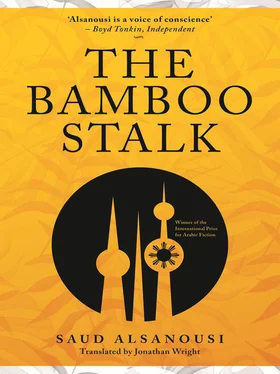On my first outing on my bike I went to Qortuba, crossing the bridge that connects Jabriya to al-Surra, and then crossing Damascus Street. I rode my bike parallel to the pedestrian street in Qortuba. I was horrified at what I saw near my favourite spot in the narrow lane near the main street, the spot where I used to sit that was full of trees. In the dusty area behind I saw an enormous truck in a chain-link enclosure with barbed wire at the top. It was a flatbed truck with many wheels and it was carrying a large container with a long metal pole sticking out through the roof. Without much thought and without needing to guess I realised that what was going up before my eyes was a mobile phone relay tower. The similarity between this tower and the one that took up a corner of Mendoza’s land left no room for doubt. Strange that the two of them should have gone up in places that I loved.
From that day on I never went near the pedestrian street.
* * *
Apart from its basic function, food was a way of passing the time. If I felt bored, as I often did, I would amuse myself by working in the kitchen.
Life was simple compared with the life of my family in the Philippines. I had a kitchen that was fully equipped with the latest appliances and gadgets without me having to borrow a cent from the greedy Indian moneylenders as my family had done when they were poor, when they had to wait years before buying their next appliance. When I opened the fridge I remembered the story about the time when a fridge first arrived in our house in the Philippines. When I turned on the stove I didn’t calculate the time as Mama Aida did. I watched the small blue and yellow tongues of fire around the metal ring. Sometimes I lit the stove when I didn’t need it. I just enjoyed watching the gas burn. A large cylinder of gas didn’t cost more than three quarters of a dinar. If it ran out, I didn’t have to cook the food by burning wood in the courtyard like Mama Aida. She did that because a cylinder of gas cost more than six dinars in the Philippines, and that was a cylinder half the size of a cylinder in Kuwait. I enjoyed lighting the stove because I felt I was getting revenge on behalf of Aida.
One evening I called a taxi to go to the gas depot near the central market to change an empty cylinder. One of the streets in Jabriya was severely congested. Jabriya is always crowded. But congestion like this, with cars hardly able to move, only happened if there was an accident or a checkpoint. As I expected, at the end of the street there were police cars with lights flashing blue and red. The police were standing by the side of the road checking driving licences and car papers. The taxi driver opened his window and handed his papers to the policeman. The policeman examined them and before handing them back to the driver he asked me for my identity card. I stuck my hand in my trouser pocket but my wallet wasn’t there. I panicked. I pointed back down the street and said, ‘It’s in the flat.’
He didn’t understand me. ‘Iqama, iqama, ’ he demanded in Arabic, meaning he wanted proof that I was a legal resident in Kuwait.
Because I’m Kuwaiti and don’t need a residence permit, I said, ‘No iqama. ’. Apparently I failed to explain myself. He told me to get out of the taxi. I tried to explain to him but he was shouting at me so rudely that I couldn’t say anything. I took out my mobile phone to call my aunt Hind. I don’t know why her in particular, but she didn’t answer my call anyway. I sent a text message to Khawla, saying, The police are detaining me . The policeman pushed me from behind and suddenly I found myself in a van parked on the kerb, packed with migrants who didn’t have identity papers or valid visas. There were Arabs, Indians, Filipinos and Bangladeshis, and me — a Kuwaiti who didn’t look like other Kuwaitis.
The van set off. Some people look frightened and others indifferent. ‘The worst that can happen is we’ll be deported,’ someone said. I told the policeman standing by the van door that I was Kuwaiti. I don’t think he heard what I said. He pointed to the seats at the back and spat out some words I didn’t understand. Terrified, I went back to my seat.
A stunningly beautiful young Filipina who was sitting close by turned to me and said, ‘The weekend starts today so we’ll have to stay in the cells at the police station till the officer comes after the weekend.’
I opened my eyes wide. ‘But I’m Kuwaiti. I don’t need a visa,’ I said.
She smiled. ‘You’ll have to prove that, after you’ve spent some time in detention,’ she said. An older Filipina woman was crying and the young Filipina turned to her.
‘I’ve been working in Kuwait without a valid residence for months after running away from my employer’s house. I have a family that will die if I’m deported,’ said the older woman.
‘If it’s that serious. .’ said the younger woman. She paused a moment. ‘. . then you’ll have to make some concessions.’
The woman gasped in shock at the possible implications of what the girl had said, then laid into her with the foulest insults, such as ‘filthy whore ’ and so on.
The young woman turned to me and said, ‘But it doesn’t look as if you have anything to offer.’ She gave a vulgar laugh. ‘I have an old mother and three younger brothers. I’ve sacrificed everything for their sake,’ she added.
The woman had experience. This wasn’t her first time. She said she didn’t usually stay in jail long. If the policeman in charge on the morning shift was incorruptible, his colleague on the late shift probably wouldn’t be. If the first day went by without someone trying to seduce her in exchange for setting her free, then that certainly wouldn’t continue through the second day. ‘I’ve often paid for my residence permit by illegal means. Sometimes it happens in an empty room at the police station, or in their car or in an apartment where things like that take place,’ she said. ‘Do you know how many policemen I have on the contacts list in my phone?’ she concluded defiantly.
Our mobile phones were confiscated. Before anyone questioned us, we were moved from the van straight to a foul holding cell. I thought to myself it would have been much better if I’d run into a fake policeman like the one who had taken ten dinars from my wallet a year earlier. That way losing the money would have been the end of it, rather than meeting a real policeman and ending up detained in the police station.
I spent two nights behind bars in the cell, at least by my watch. But it felt like many nights more. It was a small room, as dirty as the ten inmates. The smell of the place and of the people was unbearable. The dry January cold numbed my fingers and toes and went right to the bone. People looked calm. Except for me, they all knew what was in store for them. I didn’t know how long I would be held there. We could hear women’s voices nearby and I later found out that the cell for women was at the end of the corridor. The older Filipina woman had been crying since we were in the van but now it was louder. She kept complaining, sometimes in English and sometimes in Arabic, in the hope that someone would understand and give her a chance to get out. ‘They’ll die of hunger if I’m deported. I beg you, I beg you,’ she said. My fellow prisoners fell asleep one after another. The woman’s wailing grew even louder. From behind the bars I saw a policeman with a black stick hurrying towards the women’s cell.
I cowered where I sat, imagining what might be in store for the woman. ‘ Allahu akbar, Allahu akbar ,’ I murmured. ‘Don’t let him do her any harm.’ The policeman shouted something unintelligible. My heart raced. The woman shouted back. I pulled my knees up against my chest and mumbled, ‘Please don’t provoke him.’ They shouted louder. ‘Please don’t hurt her,’ I said to myself. A loud crack interrupted their conversation. The prisoners woke up around me. The policeman was hitting the bars of the cell with his stick. Then the place fell silent. The policeman went back where he came from and my pulse reverted to normal. The men went back to sleep, but I couldn’t even close my eyelids. I gave a long sigh. ‘ Allahu akbar , God is the mightiest, thank you,’ I said.
Читать дальше












